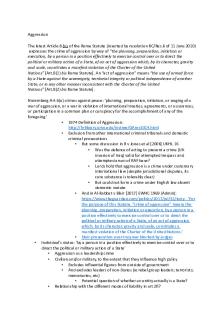Criminal Law II Reviewer.doc DOC

| Title | Criminal Law II Reviewer.doc |
|---|---|
| Author | Dennie Vieve D Idea |
| Pages | 187 |
| File Size | 1.1 MB |
| File Type | DOC |
| Total Downloads | 30 |
| Total Views | 79 |
Summary
REVISED ORTEGA LECTURE NOTES ON CRIMINAL LAW 1 TITLE I. CRIMES AGAINST NATIONAL Almost all of these are crimes committed in SECURITY AND THE LAW OF NATIONS times of war, except the following, which can be committed in times of peace: Crimes against national security (1) Espionage, under Article 114 ...
Description
R REVISED EVISED O ORTEGA RTEGA L LECTURE ECTURE N NOTES OTES ON ON C CRIMINAL RIMINAL L LAW AW TITLE I. CRIMES AGAINST NATIONAL SECURITY AND THE LAW OF NATIONS Crimes against national security 1. Treason (Art. 114); 2. Conspiracy and proposal to commit treason (Art. 115); 3. Misprision of treason (Art. 116); and 4. Espionage (Art. 117). Crimes against the law of nations 1. Inciting to war or giving motives for reprisals (Art. 118); 2. Violation of neutrality (Art. 119); 3. Corresponding with hostile country (Art. 120); 4. Flight to enemy's country (Art. 121); and 5. Piracy in general and mutiny on the high seas (Art. 122). The crimes under this title can be prosecuted even if the criminal act or acts were committed outside the Philippine territorial jurisdiction. However, prosecution can proceed only if the offender is within Philippine territory or brought to the Philippines pursuant to an extradition treaty. This is one of the instances where the Revised Penal Code may be given extra- territorial application under Article 2 (5) thereof. In the case of crimes against the law of nations, the offender can be prosecuted whenever he may be found because the crimes are regarded as committed against humanity in general. Almost all of these are crimes committed in times of war, except the following, which can be committed in times of peace: (1) Espionage, under Article 114 – This is also covered by Commonwealth Act No. 616 which punishes conspiracy to commit espionage. This may be committed both in times of war and in times of peace. (2) Inciting to War or Giving Motives for Reprisals, under Article 118 – This can be committed even if the Philippines is not a participant. Exposing the Filipinos or their properties because the offender performed an unauthorized act, like those who recruit Filipinos to participate in the gulf war. If they involve themselves to the war, this crime is committed. Relevant in the cases of Flor Contemplacion or Abner Afuang, the police officer who stepped on a Singaporean flag. (3) Violation of Neutrality, under Article 119 – The Philippines is not a party to a war but there is a war going on. This may be committed in the light of the Middle East war. Article 114. Treason Elements 1. Offender is a Filipino or resident alien; 2. There is a war in which the Philippines is involved; 3. Offender either – a. levies war against the government; or b. adheres to the enemies, giving them aid or comfort 1...
Similar Free PDFs

Criminal Law II - Notes
- 93 Pages

Criminal Law II Reviewer
- 73 Pages

Criminal Law II Reviewer.doc
- 187 Pages

Criminal Law II
- 96 Pages

Criminal Law II Reviewer
- 87 Pages

Criminal Law II Reviewer
- 73 Pages

Criminal Law
- 77 Pages

Criminal Law
- 2 Pages

Case Law Table Criminal Law
- 7 Pages

Criminal law notes
- 41 Pages

Referencing - criminal law
- 3 Pages

Criminal Law Outline
- 50 Pages

MBE-Criminal law outline
- 13 Pages
Popular Institutions
- Tinajero National High School - Annex
- Politeknik Caltex Riau
- Yokohama City University
- SGT University
- University of Al-Qadisiyah
- Divine Word College of Vigan
- Techniek College Rotterdam
- Universidade de Santiago
- Universiti Teknologi MARA Cawangan Johor Kampus Pasir Gudang
- Poltekkes Kemenkes Yogyakarta
- Baguio City National High School
- Colegio san marcos
- preparatoria uno
- Centro de Bachillerato Tecnológico Industrial y de Servicios No. 107
- Dalian Maritime University
- Quang Trung Secondary School
- Colegio Tecnológico en Informática
- Corporación Regional de Educación Superior
- Grupo CEDVA
- Dar Al Uloom University
- Centro de Estudios Preuniversitarios de la Universidad Nacional de Ingeniería
- 上智大学
- Aakash International School, Nuna Majara
- San Felipe Neri Catholic School
- Kang Chiao International School - New Taipei City
- Misamis Occidental National High School
- Institución Educativa Escuela Normal Juan Ladrilleros
- Kolehiyo ng Pantukan
- Batanes State College
- Instituto Continental
- Sekolah Menengah Kejuruan Kesehatan Kaltara (Tarakan)
- Colegio de La Inmaculada Concepcion - Cebu


